The story of OurLand begins when its founder Vijo Varghese left his job in sales at a big company and realized that he needs to radically change his life. He felt burned out from corporate life in the big city and that only a place in nature can cure his mental health and help him find inner peace. Almost ten years later, this feeling has grown into a nature education center that offers courses for people from around the world and is coincidentally located in an important elephant corridor.
How OurLand started
The first step of Vijo’s journey was to find this place in nature and connect with people that are willing to start this journey with him. He found this person in his old friend and now co-founder Anshuman Tripathy. Together, they looked for a piece of land, where they could get away from the busy city life of Bangkok and create a space to try out the many ideas floating in their minds. They found it around 150km northwest of Bangkok wedged between the Khwae Yai river and the Salakpra Wildlife Sanctuary. This plot was part of a piece of land that a developer bought to construct big residential buildings in the 1990s. Due to financial issues, this project never became reality and the only remnants of this plan are small roads crisscrossing the area. The only structure of the land that Vijo and Anshuman leased was not more than a big metal roof that was used as an elephant shelter for a nearby elephant resort, surrounded by secondary forest. What they didn`t know back then is that this land is also part of an important elephant corridor as they move from the sanctuary to the river. This path is vital for the elephants because there is no major water source in the sanctuary and they rely on the Khwae Yai to drink in the dry season. Once they got to know about this dangerous situation, they started buying small plots in the corridor to secure them and they still continue this with the hope to one day protect the whole corridor from deforestation and development, protecting the elephants’ life as well.
In the eight years since Vijo and Anshuman started OurLand, the growing team tried many things on their property and beyond. When we visit OurLand, we are told to meet the team at the main road. They guide us through the secondary forest to a place where a pickup waits for us. Rahul, social media manager, tells us that instead of walking to OurLand, we will float there. So, the pickup takes us further through the forest until we arrive at the river, where put on our life vests (as shown below) and hop into the river slowly floating in the current along farms and forests towards the center. It is surely an interesting setting for an initial conversation and we quickly understand that OurLand is no ordinary nature conservation organization.

Vijo is aware that he is not a professional nature conservationist, but an ex-salesman who found his way to happiness in nature. And this is what he wants to share with other people. After we get out of the water and walk to OurLand through the jungle seeing signs of elephant presence, we realize that we are just around the corner from where we started with the pick-up. But just driving to OurLand would be pretty boring, while now we already experienced our first adventure before even arriving. At the center, Rahul shows us some more of the things that they have tried and created here. A surprisingly simple biogas reactor, which basically just looks like a big bag with a chimney, creates gas for cooking and the only accommodations on site are a few all-bamboo huts, in which Vijo lived full time for years while kick-starting OurLand. A newer project is a mud house that they built completely themselves.
Towards self-sufficiency
As OurLand grew, so did the holistic approach to living sustainably. The facilities are off-grid with its own rain water collection and solar power supply and they even bought a nearby farm to produce their own food. Here, they try out permaculture and agroforestry approaches like planting mangoes, bananas and rambutans interspersed while growing vegetables like morning glory in between. Currently, they are trying whether they can switch from rice to hemp production, which might be able to reduce human-elephant conflict if the elephants are less interested in the hemp. The farm’s products like dried bananas, redwood tea and hemp products will also be sold in the future.

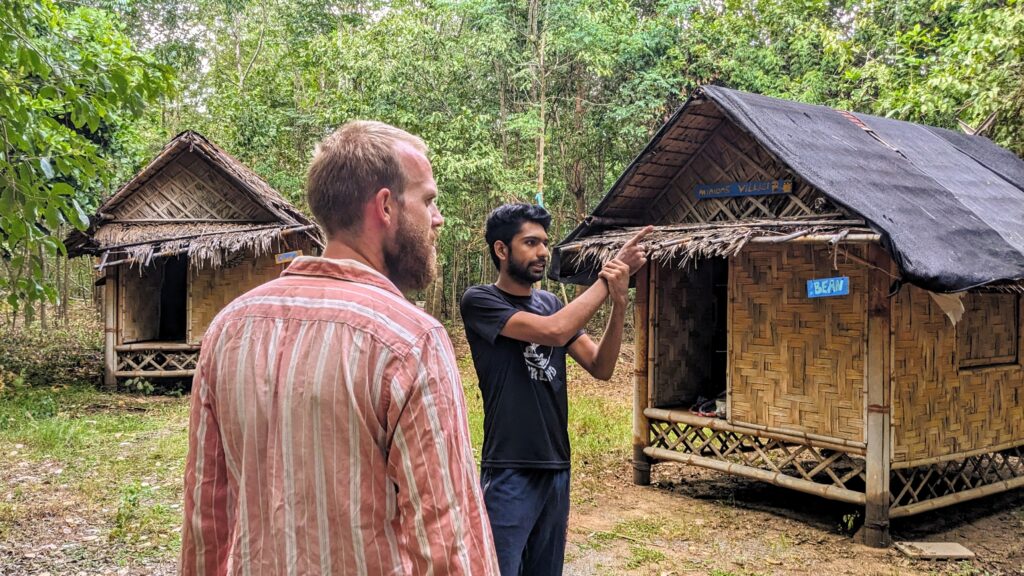
The actual land, however, is only one part of OurLand. It is not (only) a physical place, as Vijo explains us. His idea was always to use this land as a space to teach other people the lessons that helped him in finding happiness. While he might not be a trained nature conservationist, he clearly did a lot of research in nature education and the role of nature in mental health. And he also used his business knowledge make OurLand financially stable. Unlike most nature conservation organizations, OurLand is not a non-profit organization, but a social enterprise. It is not dependent on grants, funds and donations, but makes most of its income with its nature education courses that groups of students can book. OurLand is supposed be a profitable company that does not rely on philanthropy or public funding, but uses its profits for good causes.
The power of awe
No matter who visits OurLand, Vijo’s first goal is always to inspire ‘awe’ in them. He strongly believes, supported by science, that this is crucial for one’s mental health as it was for his and hopes to heal nature and people by making their connection experienceable. OurLand aims to promote ‘biophilia’, the love of nature, amongst its visitors and bring them closer to nature, from which many people are far removed nowadays – a process which Vijo calls ‘biophobia remediation’. In a more practical way, the team shows its visitors how a sustainable lifestyle can look – not in a theoretical way, but in the way how the people of OurLand live their everyday lives. Activities for visitors reach from collecting cow dung for making compost and producing biogas to building a mud house as well as learning about elephant conservation.
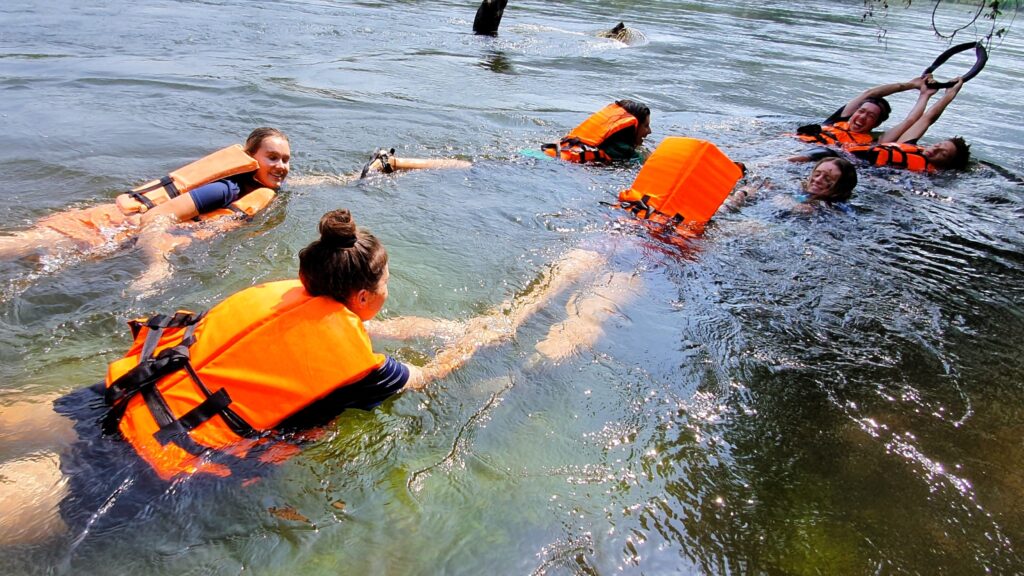
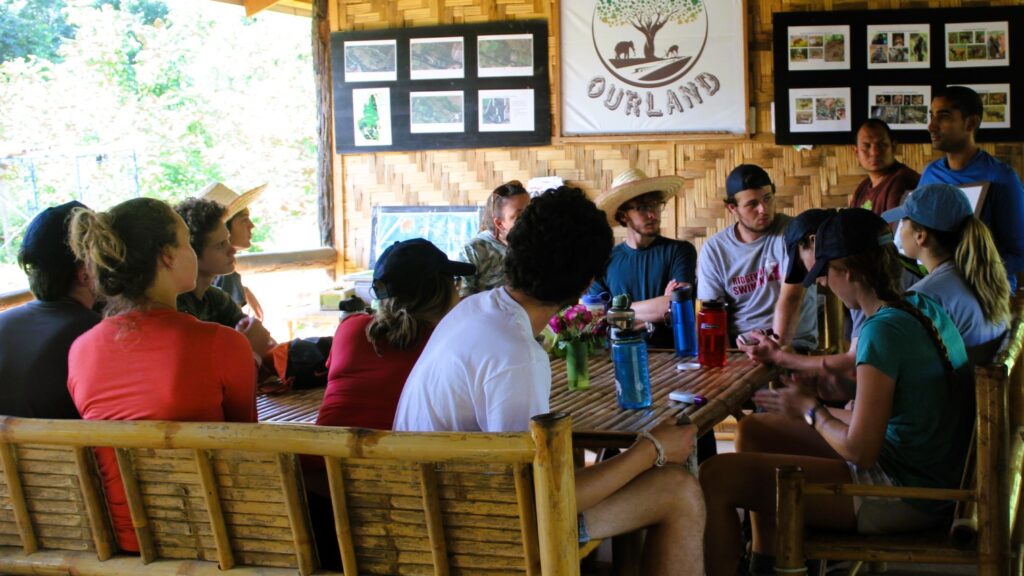
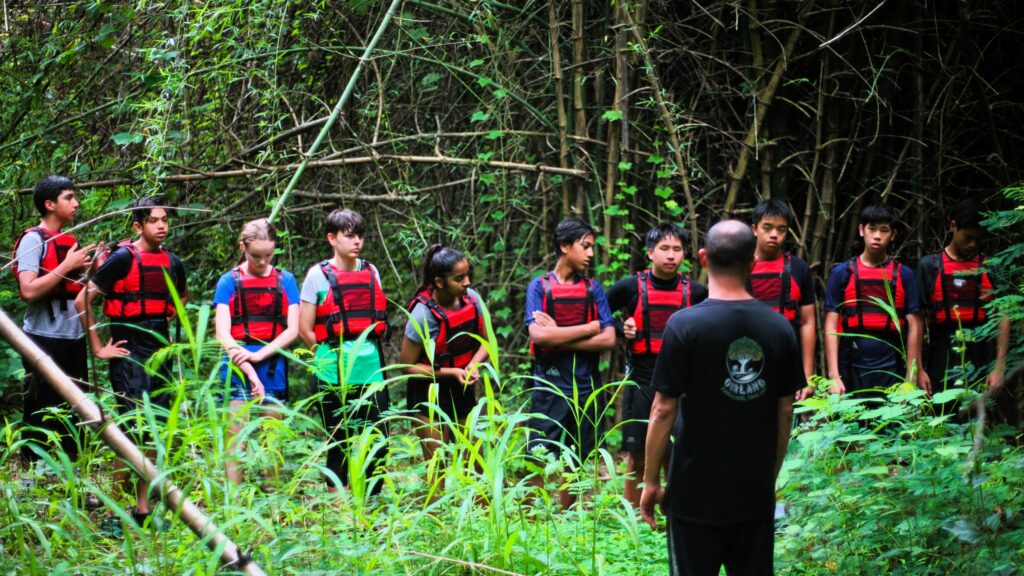
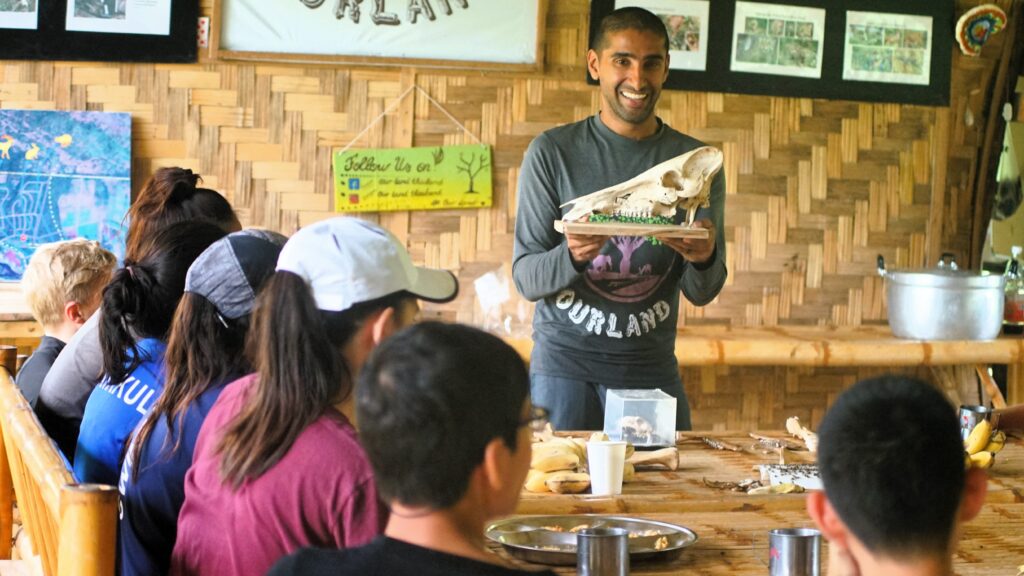
The biggest current vision and project of OurLand is to transfer this concept from physical visitors to a digital audience as well. The biggest part of the team is actually not located at their site, but works remotely from around the world. Rahul explains us that currently they are specifically targeting YouTube to build up a new audience. The first big step was to cover the construction of the mud house in a video series and Rahul hopes that this will not only become a new way to spread their messages, but also to earn money for OurLand.
It took me six years to understand that education should be the focus of OurLand.
Vijo Varghese, co-founder
After starting too many things in the first years of OurLand, Vijo realized one thing: You cannot and need not do everything yourself. Hence, OurLand is creating a lot of connections and cooperations to broaden its activities and offer its visitors more possibilities. Currently, they are for example working on a marine education program in Southern Thailand in cooperation with a local diving school that will deal with topics like plastic pollution, sea grass and mangroves. OurLand also built up a reputation in human-elephant conflict by working with partners, namely Zoological Society of London(ZSL Thailand), Human Elephant Voices Network (HEVN) and Seub Foundation. Together they are in discussion with UNEP, UNDP, UNRCO and the FAO on how these issues can be tackled. To expand on this, they started an academic partnership with the University of Lodz in Poland to research the biodiversity in the elephant corridor.
OurLand will continue growing
The story of OurLand and Vijo shows that involvement in nature conservation can grow out of many situations, take many forms and incorporate almost endless ideas. In fact, what we mentioned here is just a small selection of their activities, so head over to their website to find out more about what they do. While it seems that Vijo found OurLand’s main focus in education, we are sure that also in the future there will be all kinds of interesting activities happening in and around OurLand. And we are confident that along this journey full of twists and turns, many people will feel the same awe and peace that Vijo found in nature, creating a community of nature lovers or ‘biophiles’.

